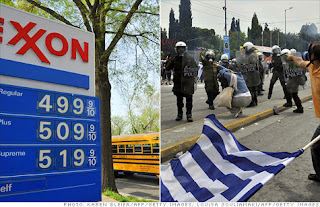(Reuters) - Spot gold held steady on Tuesday, after a warning by ratings agency Standard & Poor's that it would treat plans for a rollover of privately-held Greek debt as a selective default, underpinning safe haven demand for bullion.
FUNDAMENTALS
* Spot gold rose 0.09 percent to $1,496.84 an ounce by 0038 GMT (8:38 p.m. EDT).
* U.S. gold gained 1 percent to $1,497.60.
* Rating agency S&P warned Greece would likely be in default if it follows a debt rollover plan pushed by French banks.
* The euro hovered near one-month highs versus the dollar, shrugging off S&P's warning on Greece, as expectations that the European Central Bank will raise interest rates on Thursday helped buoy the single currency.
MARKET NEWS
* The dollar index .DXY gained slightly on Tuesday, but remained near one-month lows.
* U.S. crude futures edged up on Tuesday to remain above $95 a barrel, ahead of U.S. factory orders data gauging the strength of the world's top economy and oil consumer.
(Reporting by Rujun Shen; Editing by Ed Lane)
The scariest risks to the economy
NEW YORK (CNNMoney) -- U.S. policymakers are racing to reach an agreement before the debt ceiling is breached. But the biggest risks to the U.S. economy are mostly out of their hands.
CNNMoney surveyed 27 economists and asked them to choose from a list of possible threats facing the economy. What scares them most? A sovereign debt default by a European country such as Greece. More than half of those surveyed ranked it as one of their top two concerns, with 10 choosing it as their number one worry.
"A Europe debt default could cause financial crises as large as the 2008 one due to financial system interconnections," said Bill Watkins, executive director of the Center for Economic Research and Forecasting.
Another oil price shock, which most likely would come from further political turmoil in the Middle East and North Africa, is their next biggest worry.
See the full survey results
Many economists blame the spike in oil earlier this year for the slowdown in economic growth, as it raised costs for businesses and cut into consumer spending. And though oil and gas prices have come off their highs of a couple of months ago, the threat they pose to the economy has not vanished.
"Oil prices sustained above $125 a barrel for six months or longer would guarantee another recession in 2012," said James Smith, chief economist for Parsec Financial Management.
After tumbling on the news that the U.S. was releasing 30 million barrels of oil from the Strategic Petroleum Reserve, oil prices are on the rise again, currently hovering around $95 a barrel.
Recovery at risk
Earlier in the year, the economy seemed to be on the road to recovery. But economic growth began to slow in late spring, leading many economists toslash their forecasts and revive talk of a double-dip recession.
Though the economists do see major risk from a possible U.S. default in the event that Congress does not raise the debt ceiling, they did not view that as being very likely.
"While the consequences of Congress failing to raise the debt ceiling are most significant, the probability of that occurring are extremely remote," said Kevin Giddis, head of fixed income for Morgan Keegan, who ranked it as the least serious threat.
Still, enough economists are worried about the debt ceiling debate that 10 of them picked it as one of the top two worries, with six of those ranking it number one.
Relatively few of the economists surveyed were worried about the other risks they had to choose from -- a slowdown among emerging economies such as China, or budget cutting by federal, state and local governments.
"Austerity is a short-term risk, but will help long-term," said David Wyss, former chief economist at Standard & Poor's, now visiting fellow at Brown University. "The odds of too big a budget cut seems small."

